Dak Prescott Is Manifesting What Matters As America’s Quarterback
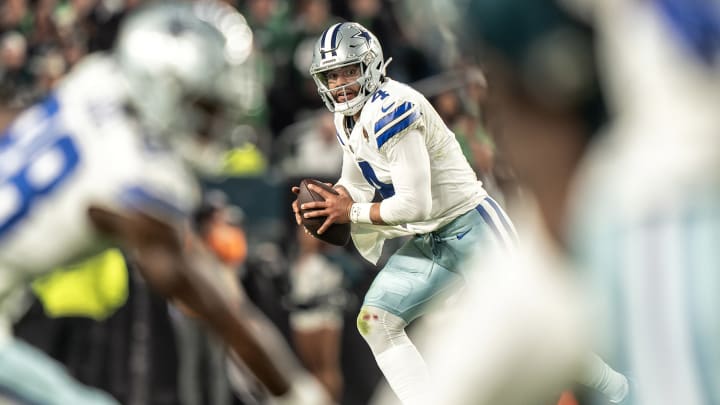
On Jan. 2, 2024, five days before the Dallas Cowboys’ regular-season finale, the franchise’s palatial, constellation-heavy headquarters are nearly empty. Only cubicle dwellers fill the cavernous space with sound, until Dak Prescott enters, strolling toward the locker room with his physical therapist, Luke Miller, in tow.
Both head to a small space attached to the trainer’s room, where Prescott reclines atop a blue exam table. The quarterback is lying flat on his back, a stack of towels resting on his stomach. Miller goes to work on his body, kneading over tattoos, scars and the expected welts, tight spots, and painful bruises accumulated over 17 weeks of an NFL season. Still, Prescott is giddy. The important stuff, a long time coming, is now here: six weeks as potentially transformative as any stretch in his full, celebrated, scrutinized, loss-heavy life.
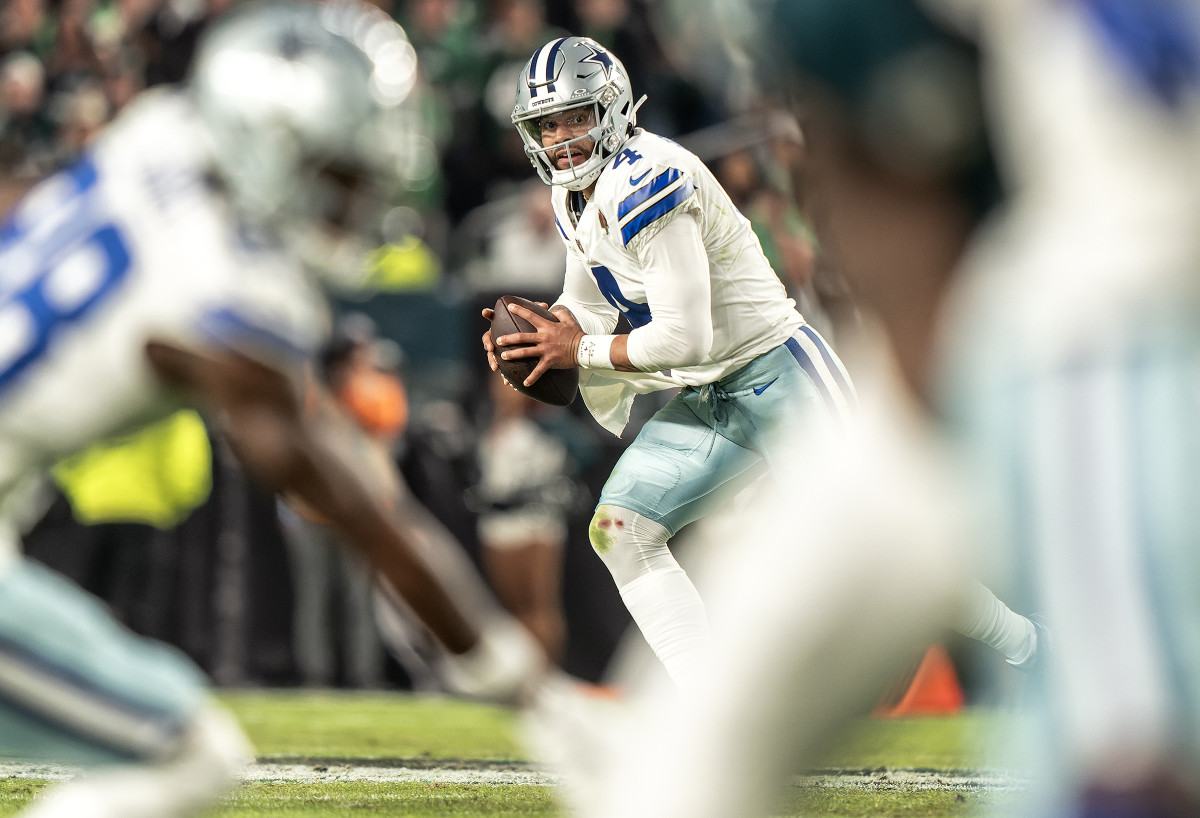
Because this is Rayne Dakota Prescott, manifesting outcomes is expected. He bought the backpack he now carries everywhere in Los Angeles last summer, the purchase driven less by the brand (Louis Vuitton) and more by its initials (LV), which remind him hourly where Super Bowl LVIII will take place next month.
He also continues listening to the playlist he made before the season. Prescott shaped last year’s collection in honor of his golden birthday (turning 29 on July 29, 2023). This year, every selection spoke to Las Vegas, the Super Bowl, or its current iteration, LVIII (58). He listens to only the mix—titled LV58—on game days, to remind him of what he wants, what matters and what’s ahead. He estimates that 60% of the selections have “way deeper meaning” beyond just raising adrenaline levels.
There are 145 tracks total, and the choices—hip-hop, mumble rap, country, faith-based, old-school, rock, country rap—run the musical gamut. There are many artists with Lil in their stage names (Lil Durk, Lil Baby, Lil Kee and, the OG, Lil Wayne). Some tunes speak to those he lost—his mother, Peggy (colon cancer, 2013); his brother Jace (suicide, ’20)—reminding him of the best times they spent together. “Songs that usually, when I hear them, take me beyond the song in that moment,” he says. “A place. A memory. “Don’t Stop Believin’,” from Mississippi State. Phil Collins, “In the Air Tonight,” takes me right back to my high school field pregame …”
The meaning laced into Prescott’s existence seems to have heightened since we last sat down like this in 2021. The shift owes, in part, to a few more birthdays, plus two seasons that didn’t yield what he wanted and one more that still could.
It also comes from the pictures he shows off on his iPhone. They’re from earlier that morning, from an appointment with his partner, Sarah Jane Ramos, who is roughly 31 weeks pregnant. There they are, inside an office, the quarterback of America’s Team playing Dr. Dak. He’s holding the end of a sonogram, running it tenderly over her stomach.
In this moment, Prescott is present, vulnerable, human; just a dad-to-be, like any expecting parent. He’s more interested in discussing what the ultrasound revealed than whatever debates and misconceptions forever hover over his football career. He saw baby girl’s legs! Her profile! Some of her—his adorable words—little face. Ramos makes the same joke regularly, saying that their baby has “been living inside of me for nine months to look just like you.” Ha! Prescott is blessed, and he knows that, but how blessed becomes existential when he hears the baby’s heart thump.
The “coolest” part, on this Tuesday in early January, is when the doctor asks for a finger, then takes the digit Prescott offers and places it on his partner’s stomach, atop the baby’s back. “Rub your little girl’s feet at night every night before you go to bed,” the doctor told him.
Playlist comp: Future, “Life Is Good.”
Prescott has done the math: 31 weeks, typical pregnancy, means he should have a baby girl not even one month after the game he most desperately wants to win. “Trying to manifest a championship and a baby back-to-back,” he says. “That’s the plan. For her to come into this world with a Super Bowl champion dad.”
Playlist comp: Craig Morgan, “That’s What I Love About Sunday.”
What Prescott is manifesting—the ultimate manifestation; this ending, too perfect for Disney, not guaranteed, but more possible each week—is laid out in the lyrics.
New believers getting’ baptized
Momma’s hands raised up high
Havin’ a Hallelujah good time
A smile on everybody’s face
That’s what I love about Sunday
Dak Prescott didn’t prepare for this season of grand ambition by reading books on leadership or putting an enlightenment guru on his payroll. Instead, he broke up his established training regimen by catching more movies than ever before. But anyone expecting Braveheart, 300, or at least American Underdog, might be surprised.
Prescott gives five stars, instead, to Good Will Hunting. He won’t cop to looking for his, “How ’bout them apples” moment. But, “I see myself as Robin Williams,” he says, laughing. “The psychiatrist.”
Makes sense. Prescott studied educational psychology at Mississippi State. And he says relationships matter to him more than ever now. His brother’s death forced that understanding, because Jace always seemed so happy, so secure. “Why I push for depth is because of what happened to my brother,” Prescott says. “I won’t just take I’m good, I’m solid, for answers anymore.”
Instead, he wants to know everything, often applying psychology to football leadership. In previous offseasons, Prescott met with Navy SEALs for dinner, where they discussed optimizing performance within pressure-packed crucibles. Eventually, an idea formed: The summer lake training session the SEALs invited him to would be perfect for his annual retreat with offensive skill-position specialists. Prescott wanted to bolster their brotherhood—evolving, taking what he had done to heal what parts of himself could be healed and applying what could be applied to teammates.
Atop the training table, he says, “We have such a young team. I mean, I’m 30 years old, and I’m in Year 8, and I’m one of the oldest guys. I was in that space.”
The group of roughly 16 started their lake days with breakfast at 7:30 a.m., then broke into smaller units for wide-ranging discussions, followed by workouts on a nearby field, then strength training, lunch breaks, downtime and afternoon activities. They fired shotgun shells at sailing clay targets, hoping to top the SEALs. (No group did, because the SEALs didn’t miss. Although, neither did rookie wideout David Durden.) They hacked around the golf course attached to their hotel. They went out on boats to fish, swim, relax. They listened to guest speakers: One conducted a breathing session; another dived into performance related to fight-or-flight responses.
Playlist comp: Otis Redding, “(Sittin’ On) The Dock of the Bay.”
CeeDee Lamb considers himself a special-ops aficionado. He describes meeting the SEALs as “a huge momentum and mental shift for me, because I had the opportunity to dive into their brain(s).”
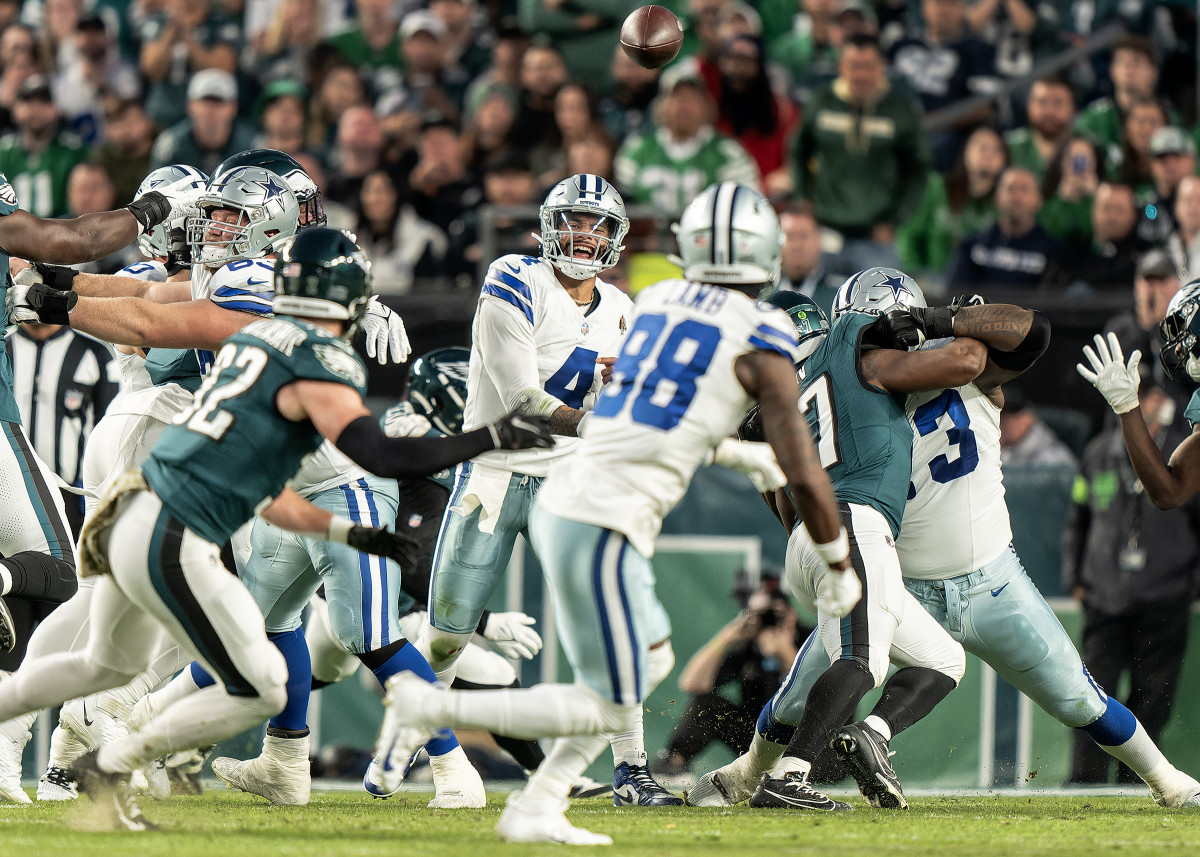
The trip accomplished exactly what Prescott wanted: heightened human understanding. He didn’t expect kumbaya forever moving forward, absent the usual squabbles and complaints that start in training camp and don’t end until half the league ends up in Cabo on vacation. But better understanding, he hoped, would yield honesty, transparency, empathy. Prescott carried the momentum from the lake back to Dallas, inviting the same group and larger ones to his house, where, conveniently, there’s half a football field in his 7-acre backyard—and where Lamb all but moved in.
Now, “when [Prescott] makes a decision, that’s the decision I’m going with,” tight end Jake Ferguson says.
The best night of the retreat was the last one, when most of the group gathered for dinner, drinks and cigars. Prescott posed a simple question after eating: “What’s your why?” He didn’t need to say his. It’s tattooed on his left arm, a quote from his mother urging him to allow her to become his story after the cancer diagnosis. Instead, Prescott listened. He can’t reveal private details, but speaks about that night in generalities: Players spoke to the worst moments and best people in their lives; they outlined personalities, motivations, quirks, dreams. Ferguson focused on his love of football born inside a family of players and coaches. Lamb says he chose to go first, and he laid out the broad outline of his story to Sports Illustrated: The wideout grew up in a single-parent home, mom and dad warring, then a beloved uncle died near the end of high school. “I really went into that,” Lamb says. “Letting them know, I’m here for football, I really have a passion for this.”
By night’s end, Prescott had a better idea of why “guys move like they do.” And he resolved, that same night, to apply everything he learned to the upcoming season.
“That’s the beauty in [approach],” Prescott says. “I might say something completely different, depending on who it is, to get them going. To instill confidence in them. I mean, nobody’s had the ups and downs of what people are trying to say about your career [more] than I have.”
Playlist comp: Sam Cooke, “A Change Is Gonna Come.”
The towel stack on his stomach in the trainer’s room reveals an odd duality. Prescott never sweats—not death threats on social media, criticism that always stretches beyond reasonable or the impossible job description of Dallas Cowboys Quarterback.
Playlist comp: Money Man, “Fear No Man.”
Those towels speak to a more literal issue. The man sweats. A lot. Maybe should see a doctor. Kinda like a human faucet. Generally changes shirts before warmups. (Lil Baby & Rylo Rodriguez, “Cost to Be Alive.”)
Thus, a confession: “I am,” he says, “the worst sweat-er on the team.”
What doesn’t matter to Prescott is what never mattered, and what never will: Everything, and everyone else. Still, notions persist, and not in distant pasts, but the most recent one. “Dak Prescott sucks, period,” retired-safety-turned-analyst Donte Whitner said after the San Francisco 49ers shellacked Dallas earlier this season. Entire online message threads have been devoted to this concept, along with a Facebook page vowing to “expose Dak Prescott for what he really is,” along with related topics, like this, on Reddit: Why do NFL fans hate Dak?
“I say this every year,” Lamb says. “Nobody gets criticized like him. I don’t care what you do. Nobody gets it like Dak, all this craziness.”
Playlist comp: Drake, “God’s Plan.”
Surely, some of the hatred cast Prescott’s way stems from playing the NFL’s glamour position for the NFL’s most glamorous franchise. Other parts seem grounded in truths. But …
In eight NFL seasons, Prescott has started at least 16 games six times, with 17 more this season. In 114 career starts, he’s won nearly twice as often (73 games) as he’s lost (41). He nearly threw for the elite benchmark of 5,000 yards one season (2019); has demonstrated consistent accuracy (at least 68 for completion percentage in three of the past four years, never below 62.9); won Offensive Rookie of the Year (’16); finished second for Comeback Player of the Year (’21); and made three Pro Bowls. For the he-doesn’t-play-well-when-it-matters crowd, Prescott has 22 game-winning drives and 14 fourth-quarter comebacks.
This season, Prescott’s 36 touchdown passes lead the NFL. He also set career highs in TD throws, completions (410) and accuracy (69.5%). He also became the first QB in league history to record four games in a single season with a completion rate above 80% and at least 30 attempts in each of those games.
Sucks?
His résumé compares favorably, per Pro Football Reference’s comparison generator, to those compiled by Josh Allen, Joe Burrow, Lamar Jackson and Jalen Hurts.
Really?
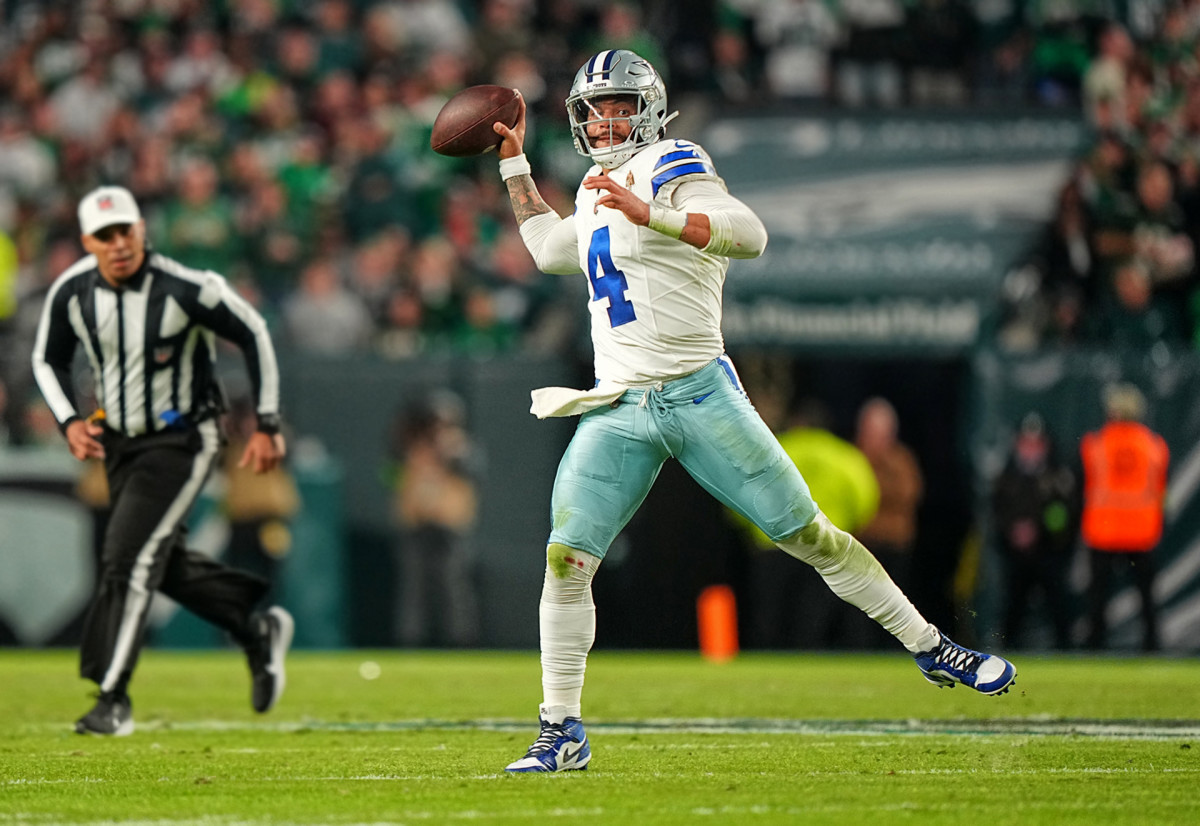
The most pertinent criticisms center primarily on two places: the league-leading 15 interceptions he threw last season and a 2–4 record, which has never exclusively been his, in the playoffs. Never mind that, in five of his eight years, the Cowboys advanced to the postseason. Or that no January defeat came by more than eight points. Or that he can’t play defense, kick field goals or morph into the primary play-caller.
Playlist comp: Drake, “No Friends in the Industry.”
What does suck is always being asked about this. Prescott doesn’t care. He doesn’t mine social media for motivation, create burner accounts for clap-backs or argue for more respect in public. He doesn’t make those arguments in private, even. More than anything, he seems confused by what most assume must matter. He “couldn’t give two s---s” about the skeptics.
Perception cannot matter, not on the precipice of everything that does. “I don’t want to say [perception] inspires or motivates me,” Prescott says. “But [skeptics] are on the side I’m proving wrong every day. Yeah, it’s just interesting, almost comical. We all see it, right? What they could be saying. What they’re trying to say. When you look at the numbers, and go back through the years, [this season] really [isn’t] all that different.”
Kinda interesting, no? The surface view of such reactions to the quarterback for America’s team seems counterintuitive, antithetical. But isn’t America exactly that right now, everyone divided, everything extreme? Perhaps that makes Prescott perfect for the impossible calculus that is his job description. Not just to throw touchdown passes or win football games, but return Dallas to the summit, its last championship from the 1996 season, while most of the world watches and most from one of two extremes.
Know this: Prescott isn’t trying to win a Super Bowl to prove anything to anyone he doesn’t know. He calls this the “sense of grace in staying consistent, understanding that for this to happen, you’re going to go through the flames. There’s no way you’re going to get there without doing this s---. Some people do. But that doesn’t mean you should stop when yours gets harder.”
Playlist comp: Lil Durk, “All My Life.”
“Why don’t I let that sit?” Prescott asks, eyebrow cocked, diving into the instantaneous nature of social media. “Because I know psychology. I’m not going to allow somebody that don’t even believe their own f---ing thoughts to get into my head.”
In 2022, before his third season as coach in Dallas, Mike McCarthy fashioned the Cowboys theme around kintsugi, or “golden joinery.” Kintsugi is a Japanese art form where, at its most simplistic, broken pottery is repaired. Practitioners deploy urushi, a lacquer they dust or mix with gold, silver or platinum. The aim is to treat breakage and repair, not as something in need of a disguise, but as part of the history of any object. Rebuilt, but better; scarred, but not broken; never fixed entirely, nor restored to original condition, but changed, enhanced, strengthened.
The coach knew who most embodied this, his quarterback. Kintsugi, McCarthy says, “is who he is.”
Playlist comp: Chris Stapleton, “Starting Over.”
This season, McCarthy chose carpe omnia as the Cowboys’ theme. Like carpe diem, this Latin phrase centers on seizing. But instead of just a day, it means, “seize everything.” (Meek Mill, “Dangerous.”)
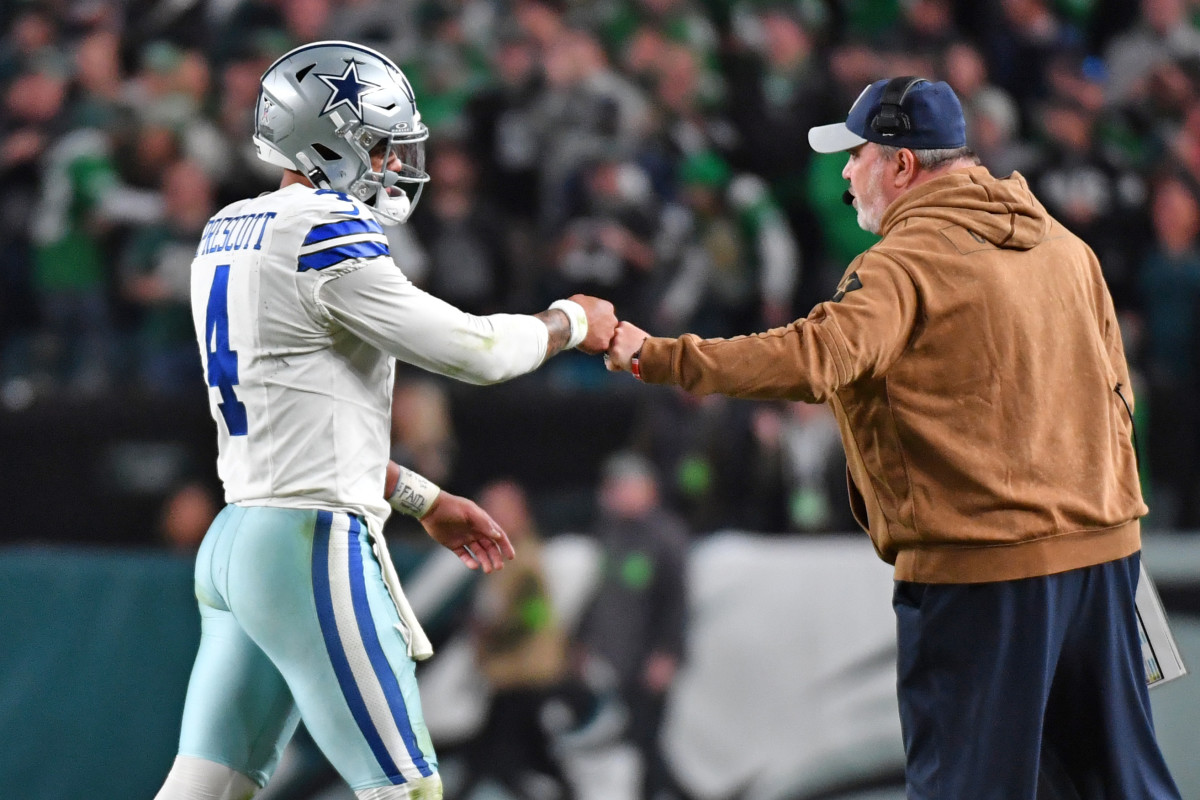
That’s the plan. And it’s another one Prescott can identify with, because it’s also him. Three years ago, his career was defined, in large part, by whom and what he had lost—his mom, his brother; and, far less important, playoff games or full health—but this season would be different. Consider 2021 Dak or ’23 Dak elite pottery in need of repair, while ’24 Dak is rebuilt, all gold.
He credits McCarthy for imprinting that particular football ethos. “Be you,” his coach always says. “We need every bit of you.”
Everyone else can wonder whether McCarthy is a better play-caller than Kellen Moore, the offensive coordinator Dallas fired after last season. Prescott won’t wonder, won’t compare. Instead, he attributes any offensive improvement to his relationship with his coach. The two meet every Thursday, going over the script for the offense’s first drive in its next game. But these meetings always last at least an hour—one stretched almost three—and tend to require between 20 and 30 minutes of football. “There’s not a [topic] we haven’t covered,” Prescott says. They spin through everything, from fatherhood to pride in their hometowns to vastly different life experiences. Recently, they watched clips of Steel Magnolias, laughing through the crying/cemetery/slap her! scene.
“It’s clearly based on how much he wants to talk,” McCarthy says. “He’s a good storyteller. And mine always get better with age.”
These wide-ranging discussions mattered, because each better grasped what drove the other. McCarthy points to their shared experiences, too. Both men carved out successful NFL careers, ascended to the top of their profession and took their share of public lashings, some fair, but not all. “I’m honest with him about that, too,” McCarthy says. “I had a different approach at my prior opportunity.”
With McCarthy now dialing up the offense, they melded the scheme Prescott already understood with the coach’s leanings in the West Coast offense. They started calling the current iteration of the Cowboys’ offense Texas Coast, a true blend.
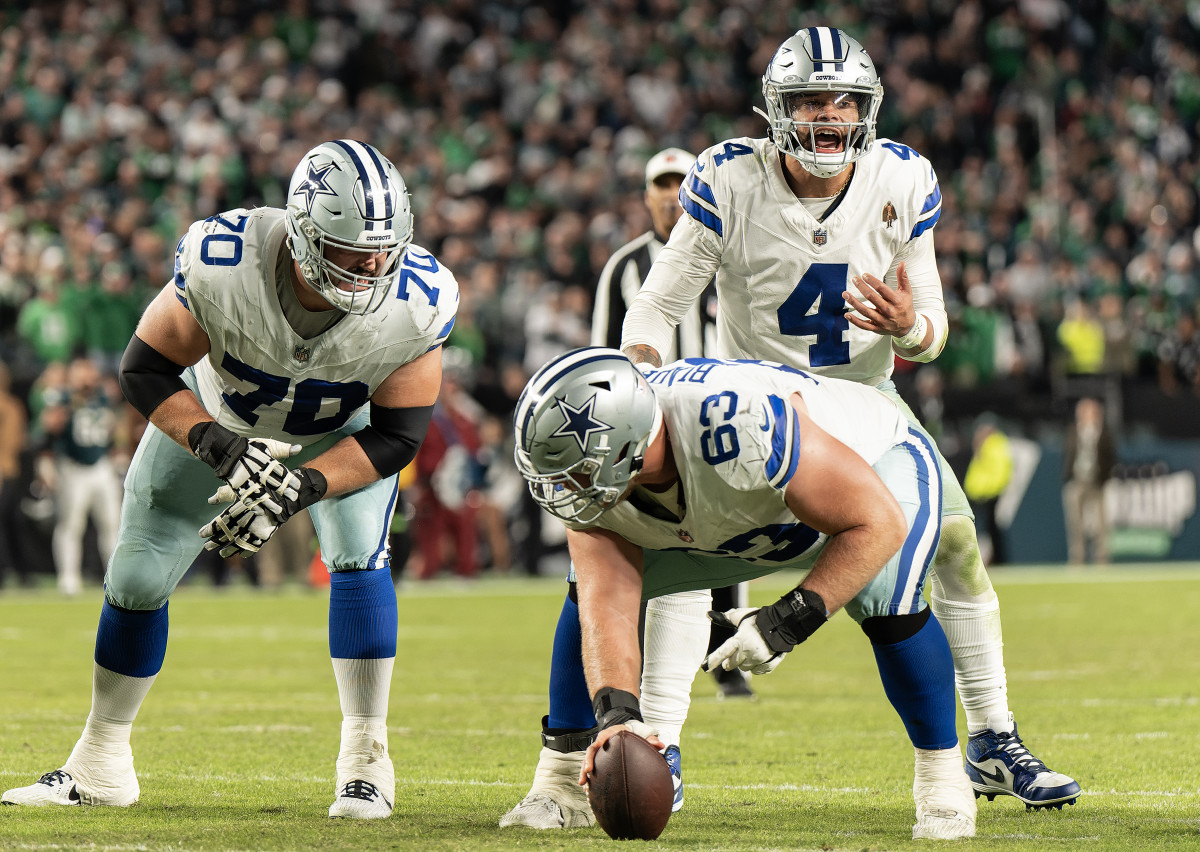
The 2023 evolution of Texas Coast isn’t just schematic in nature. It’s McCarthy encouraging Prescott to lean into his authentic self, and the quarterback doing the same for his teammates, and them doing the same for one another. They coined another term this season: Play Call with Purpose, or PCP. It means that Prescott doesn’t just hear the call, but rather, he understands the play-caller, from McCarthy’s brain, experiences, thought process and development, to how that applies to the situation at hand, and what McCarthy expects from him. Does any of that help Prescott complete another pass? It does, actually.
Playlist comp: Rihanna, “Work.”
Prescott never shrunk from accountability, like with last season’s interception total, which he describes as “bad.” But he also suggests critics take a look back at the tape. Some turnovers resulted from Prescott still learning the nuances and preferences of his targets. Others stemmed from them not understanding the same things, from him.
This season, via that better understanding, he says, Prescott finished second league-wide in tight coverage completion percentage (68.4) and ranked among leaders in completion percentage for throws over 10 yards (69.5). His 590 attempts are more than double anyone above him on that list, and the Cowboys finished third in passing offense.
The difference is simple: trust born from depth intentionally sought, culled, cultivated. (Corona, “The Rhythm of the Night.”)
It’s time to circle back to kintsugi in relation to all of this. Does Prescott consider himself broken but put back together with gold, more 50-year-old than 30-year-old, like Ferguson jokes? Or never broken and still repaired, primed for … manifesting what’s ahead?
“I don’t know if I’ve ever been broken,” he says. “But I’ve got a ton of cracks. Especially becoming a father, I don’t want to say I can’t be broken. I’m not challenging God, by any means. But I’ve been through so much, that those cracks made me stronger.”
Inside the Cowboys’ locker room, there’s an empty picture frame. It’s there on purpose. McCarthy told his players it’s reserved for the NFL’s next Super Bowl champion: them. The only way to get there, he thundered early into training camp, is to seize everything.
Playlist comp: Lil Kee, “We Gonna Make It Happen.”
The Cowboys have seized, well, most things: the NFC East, despite Philadelphia’s best-in-the-NFL start; the No. 2 seed; another home game after winning the previous 16 times at AT&T Stadium (with a second home game, too, should they beat the Packers this weekend). The vibes fashioned on that lake in Georgia, built by Navy SEALs, fortified by Steel Magnolias, Latin phrases, Texas Coast, backyard fields, PCP and oh, so many songs, have carried all the way into another year.
This approach yielded:
• The longest pass in the NFL this season (and second-longest in Cowboys history); a 92-yard scramble-strike from Prescott to Lamb against the Lions. Playlist comp: Ye, formally known as Kanye West, “Through the Wire.”
• The single-best receiving season in Dallas’s receiver-rich history, from Lamb, who refers to himself as Prescott’s co-pilot, and finished with 135 catches for 1,749 yards and 12 touchdowns. A breakout year for Ferguson (71-761-5), after a solid rookie season in 2022. (Drake, “Started From the Bottom.”)
• Twelve regular-season victories for the third-straight season. And an undefeated home record, the franchise’s first since 1981. (Shaboozey, “Winning Streak.”)
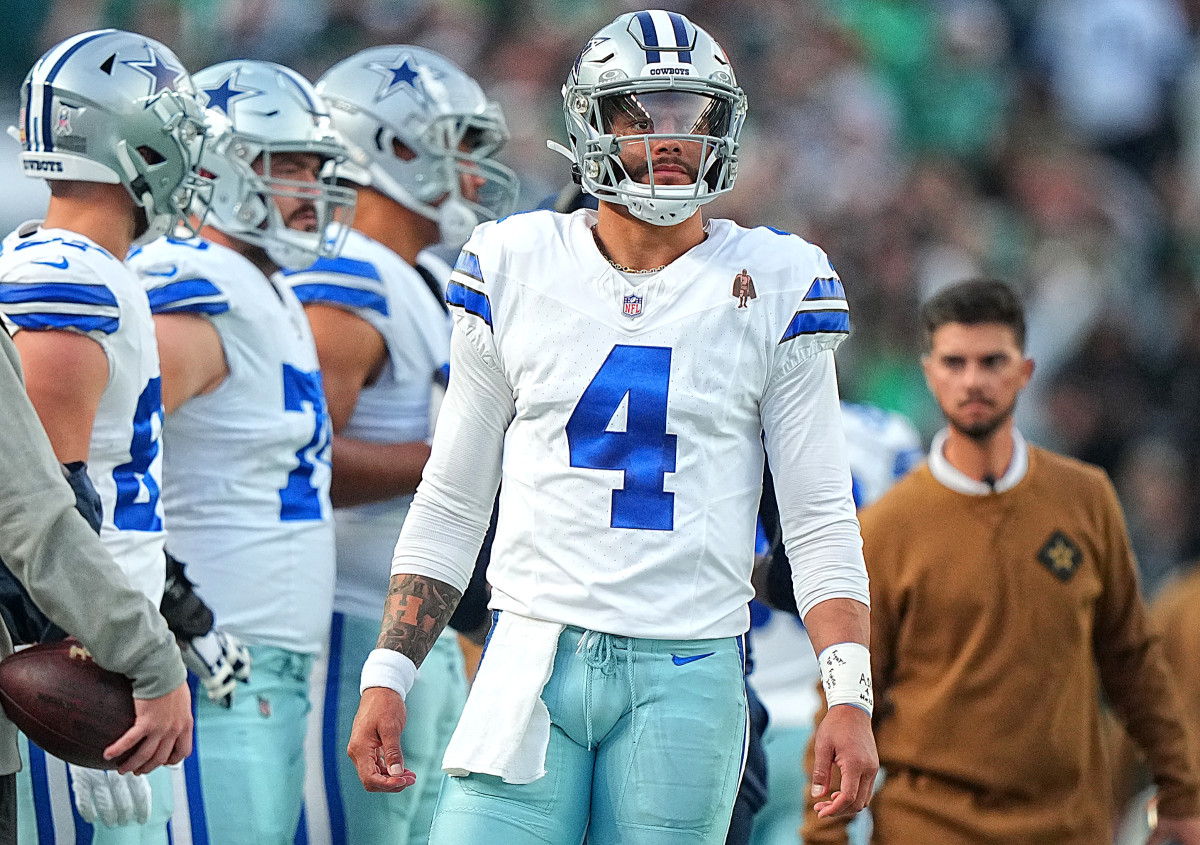
Prescott leaned into the stoic nature of Brandin Cooks and Stephon Gilmore. He prodded Tony Pollard by reminding the running back of his talent. He traded barbs with Ferguson, because that’s how they move, as Prescott would say. After Ferguson caught the game-winner against the Seattle Seahawks, the tight end promised his QB free babysitting for life. (And, after a mild run-in down the road, he just-as-jokingly took the offer back.)
The most important part of Prescott’s evolution cannot be quantified by statistics. It cannot be objectively measured at all. But any list of reasons the Cowboys can win the Super Bowl should include his leadership through vulnerability, and better understanding overall.
“That’s Dak, he’s deep, there’s a lot to him,” McCarthy says. “Through all my years of being a head coach, I’ve learned it takes defense to win championships. But you’ve got to have a quarterback to win the Super Bowl. That’s what I believe in, and that’s why I’m blessed to have [him].”
Playlist comp: David Bowie & Queen, “Under Pressure.”
Prescott wants to win that Super Bowl–nay, Super Bowls; he’s aiming for four—for everyone who flew to Georgia, or dropped by his “home” stadium, or taught him, throughout childhood and later, how to be no one other than himself. So many poured so much into him, Prescott says, that they want him to triumph almost as much as he does. “What it will do for them is the best gift I could ever give,” he says.
Then he pivots, because he is Rayne Dakota Prescott. (James Taylor, “Fire and Rain.”) He’s already manifesting what will happen after he wins a Super Bowl. He won’t take more than a week off. He won’t be able to.
The joy he finds is in the challenge. He never lambasted Cowboys “fans” who posted videos on social media using his jersey to mop floors or burned No. 4s in backyards all over Texas. A small part of him saw those, or heard about those, and thought, “Damn, that’s f---ed up.” A larger part of him appreciated the creativity. All he asks is those folks stay on that side when he proves them wrong once more. “Don’t go put that picture frame back up in the barbershop,” he says, laughing once more. “We’re good. You’re late. Nothing’s changed over here.”
He stops. Start again. “It’s all aligned.” (Ye, “Ok Ok.”)
Meanwhile, Prescott, to the surprise of no one who really knows him, is already manifesting celebrations. He can see the picture in that empty frame, even how he’s posing, surrounded by his teammates. He believes he knows the dominant emotion he will feel in that moment.
Gratitude. For the bonds he built and for the daughter he will soon welcome.
Ferguson has only one issue with the ambitious but theoretical tally of Lombardi Trophies. Four? “Why not make it five?” he says.
This week, McCarthy borrowed his quarterback’s communal spirit. Hoping to inspire Prescott and his teammates, the coach finally populated the picture frame with digital images (one from each game this season), with blank spaces reserved for each playoff game ahead.
Prescott knows exactly what kind of father he wants to be. As the official date—sometime in early March—approaches, he can’t help but consider the values passed down in childhood: family, parenting, teaching, reaching, lasting impact.
No one embodied those concepts like his grandfather Glyndell Ebarb. “If there’s one consistent person my whole life I always looked up to and wanted to be,” he says, “it was him.” Ebarb had four children, but each considered themselves his favorite, and only because he treated everyone that way, Prescott notes. Ebarb was present, engaged, the center of their lives. He was also Native American and Hispanic, didn’t come from money, served in the military and then became a principal, teacher and coach. He made everyone around him comfortable and yet, pushed them toward the best versions of themselves. In other words, he was Rayne Dakota Prescott … before Rayne Dakota Prescott.
An aunt, Valrie Gilbeaux, heard the quarterback give a speech one time and told him, “You reminded me of your papa.”
“Biggest compliment I’ve gotten in my life, hands down,” Prescott says now.
Prescott also thinks about his mom. He found out the gender of his baby in training camp and dispatched his physical therapist for the reveal. Miller went out and bought every pink thing he could find—pink candy, pink socks, pink headbands, everything, pink. Teammates teased Prescott about having a girl. “That’s what you get,” and whatnot. “Actually, it’s more of a blessing,” he says. “This is a relationship like I had with my mom. There are parallels to that special relationship. There’s nothing like it. I thought about what she would have said. It’s comforting, honestly.”
They’ve already decided on a name. Baby girl will receive hers in honor of her mother and two grandparents. Prescott says the nursery at his house is already “on point.” He’s manifesting characteristics: nurturing and protective, loving and firm; builder of resilience, spurrer of open dialogue. He wants his future daughter to fear disappointing him the way he feared disappointing Peggy.
From a family of teachers and educators and coaches, this dad-to-be ended up becoming something else. But isn’t he, en route to the precipice, doing the same things? He laughs. “Maybe it’s from my grandfather, actually,” he says. “It’s not something we talked about, but it’s, like, embedded in us.”
Only the hardest part remains, the putting everything together, kintsugi-style, to realize this opening, the triumph, followed by the newborn nestled into his arms.
He’s the oldest player on the Cowboys’ offense, the last QB from his draft class still playing for the team that drafted him. He appreciates those milestones more than the higher-profile accolades. They remind him that “s---’s not bad.” And it can only get better, broader, more meaningful.
“This,” he says, like a 50-year-old might, “is just how it’s supposed to go.”
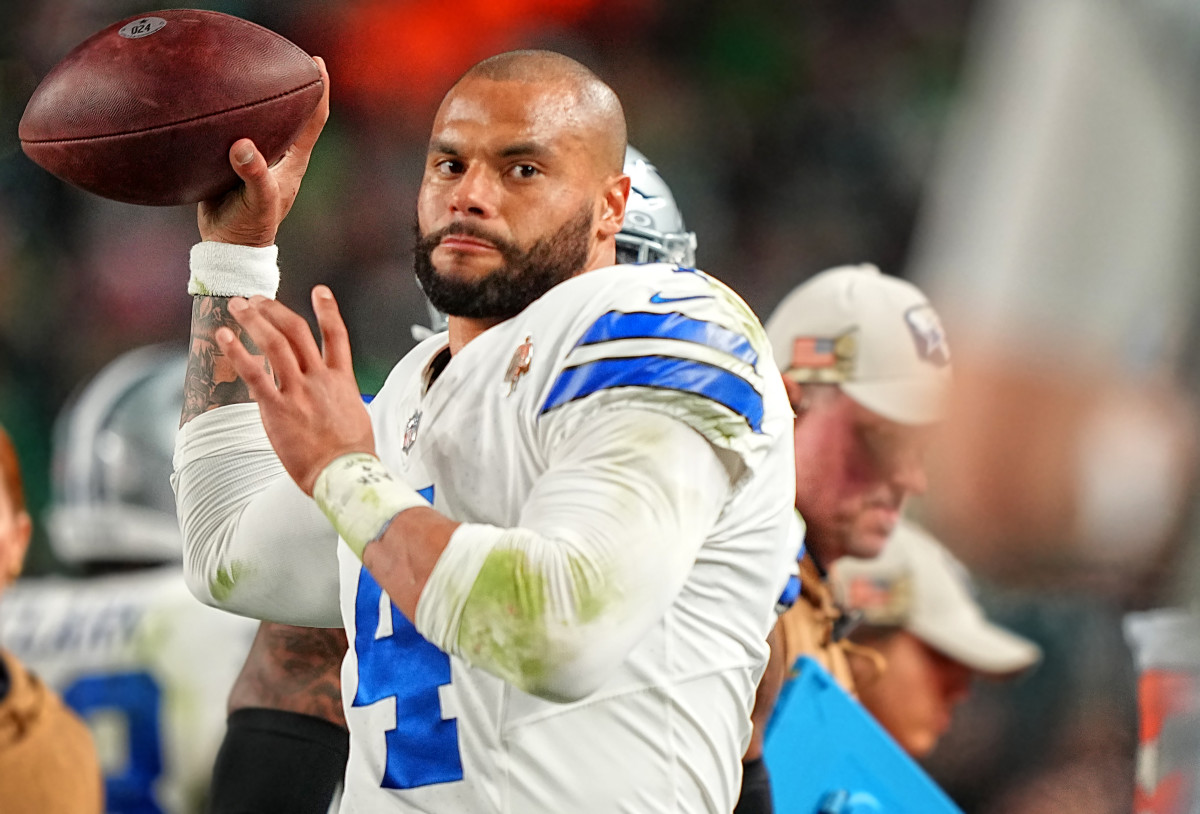
Maybe this season will end like so many others have for Prescott and the Cowboys. But maybe he’s right. Perhaps he can visualize exactly where life is supposed to take him and then manifest the perfect ending.
There was one moment during the offseason shooting session with his teammates at the lake, when Prescott knew his aims were, well, right on target. They were goofing off after the competition, aiming at those clay discs as they skipped across the lake, their individual trajectories no longer smooth or straight. In order to hit one, the shooter had to aim in front of it, allowing the disc to catch up by estimating how it might bounce off of the water.
Visualize. Manifest.
Prescott watched the SEALs miss these particular shots; some as many as six in a row. What happened next, Lamb says, made them shake their heads. Prescott grabbed a shotgun, aimed and fired.
“Smoked it,” he says, allowing a slight smile of satisfaction at another manifestation realized.
Playlist comp: Lil Baby, “From Now On.”
